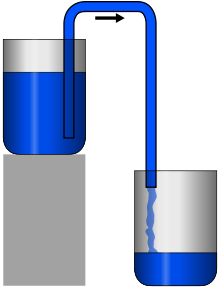What does Syphon mean?
Definitions for Syphon
ˈsaɪ fənsyphon
This dictionary definitions page includes all the possible meanings, example usage and translations of the word Syphon.
Princeton's WordNet
siphon, syphonnoun
a tube running from the liquid in a vessel to a lower level outside the vessel so that atmospheric pressure forces the liquid through the tube
siphon, syphonverb
a tubular organ in an aquatic animal (especially in mollusks) through which water can be taken in or expelled
siphon, syphon, siphon offverb
convey, draw off, or empty by or as if by a siphon
Samuel Johnson's Dictionary
Syphonnoun
A tube; a pipe.
Etymology: σίφων.
Take your glass, syphon, or crane, and draw it off from its last fæces into small bottles. John Mortimer.
Wikipedia
syphon
A siphon (from Ancient Greek: σίφων, romanized: síphōn, "pipe, tube", also spelled nonetymologically syphon) is any of a wide variety of devices that involve the flow of liquids through tubes. In a narrower sense, the word refers particularly to a tube in an inverted "U" shape, which causes a liquid to flow upward, above the surface of a reservoir, with no pump, but powered by the fall of the liquid as it flows down the tube under the pull of gravity, then discharging at a level lower than the surface of the reservoir from which it came. There are two leading theories about how siphons cause liquid to flow uphill, against gravity, without being pumped, and powered only by gravity. The traditional theory for centuries was that gravity pulling the liquid down on the exit side of the siphon resulted in reduced pressure at the top of the siphon. Then atmospheric pressure was able to push the liquid from the upper reservoir, up into the reduced pressure at the top of the siphon, like in a barometer or drinking straw, and then over. However, it has been demonstrated that siphons can operate in a vacuum and to heights exceeding the barometric height of the liquid. Consequently, the cohesion tension theory of siphon operation has been advocated, where the liquid is pulled over the siphon in a way similar to the chain fountain. It need not be one theory or the other that is correct, but rather both theories may be correct in different circumstances of ambient pressure. The atmospheric pressure with gravity theory obviously cannot explain siphons in vacuum, where there is no significant atmospheric pressure. But the cohesion tension with gravity theory cannot explain CO2 gas siphons, siphons working despite bubbles, and the flying droplet siphon, where gases do not exert significant pulling forces, and liquids not in contact cannot exert a cohesive tension force. All known published theories in modern times recognize Bernoulli’s equation as a decent approximation to idealized, friction-free siphon operation.
ChatGPT
syphon
A syphon (also spelled siphon) is a tube-like device or structure used to transfer liquid from one location to another, typically from a higher location to a lower one, using gravity and atmospheric pressure. It allows the liquid to flow upward, against gravity, before dropping down. This mechanism can be observed in various fields such as fluid dynamics, gardening, automobiles, and brewing.
Webster Dictionary
Syphonnoun
see Syphon
Chambers 20th Century Dictionary
Syphon
Syren. Same as Siphon, Siren.
Usage in printed sourcesFrom:
- [["1666","1"],["1704","1"],["1720","4"],["1725","36"],["1728","13"],["1731","46"],["1736","2"],["1738","81"],["1739","3"],["1740","5"],["1742","21"],["1750","1"],["1751","1"],["1755","1"],["1762","1"],["1763","2"],["1764","31"],["1766","9"],["1767","9"],["1769","5"],["1770","33"],["1771","6"],["1772","1"],["1773","2"],["1774","31"],["1775","11"],["1776","91"],["1777","7"],["1779","11"],["1780","8"],["1781","24"],["1782","24"],["1783","6"],["1784","44"],["1785","8"],["1786","5"],["1787","10"],["1788","12"],["1789","26"],["1790","151"],["1791","4"],["1792","18"],["1793","25"],["1794","124"],["1795","26"],["1796","68"],["1797","12"],["1798","8"],["1799","90"],["1800","32"],["1801","67"],["1802","96"],["1803","141"],["1804","58"],["1805","97"],["1806","151"],["1807","71"],["1808","46"],["1809","134"],["1810","43"],["1811","55"],["1812","38"],["1813","78"],["1814","167"],["1815","335"],["1816","23"],["1817","64"],["1818","61"],["1819","184"],["1820","62"],["1821","73"],["1822","635"],["1823","287"],["1824","110"],["1825","171"],["1826","163"],["1827","248"],["1828","158"],["1829","323"],["1830","441"],["1831","361"],["1832","217"],["1833","93"],["1834","117"],["1835","141"],["1836","254"],["1837","222"],["1838","307"],["1839","190"],["1840","279"],["1841","301"],["1842","228"],["1843","211"],["1844","133"],["1845","227"],["1846","255"],["1847","207"],["1848","308"],["1849","443"],["1850","394"],["1851","227"],["1852","369"],["1853","328"],["1854","290"],["1855","426"],["1856","317"],["1857","334"],["1858","272"],["1859","295"],["1860","387"],["1861","316"],["1862","119"],["1863","316"],["1864","215"],["1865","240"],["1866","230"],["1867","388"],["1868","486"],["1869","268"],["1870","205"],["1871","261"],["1872","589"],["1873","460"],["1874","436"],["1875","418"],["1876","431"],["1877","528"],["1878","1054"],["1879","599"],["1880","505"],["1881","569"],["1882","578"],["1883","789"],["1884","535"],["1885","403"],["1886","659"],["1887","388"],["1888","307"],["1889","320"],["1890","573"],["1891","614"],["1892","490"],["1893","652"],["1894","632"],["1895","477"],["1896","494"],["1897","389"],["1898","495"],["1899","352"],["1900","549"],["1901","1082"],["1902","926"],["1903","776"],["1904","597"],["1905","950"],["1906","858"],["1907","1016"],["1908","943"],["1909","1078"],["1910","777"],["1911","756"],["1912","1356"],["1913","907"],["1914","576"],["1915","491"],["1916","706"],["1917","527"],["1918","482"],["1919","485"],["1920","1103"],["1921","981"],["1922","597"],["1923","374"],["1924","549"],["1925","500"],["1926","473"],["1927","362"],["1928","407"],["1929","260"],["1930","450"],["1931","354"],["1932","305"],["1933","181"],["1934","296"],["1935","238"],["1936","338"],["1937","514"],["1938","299"],["1939","298"],["1940","208"],["1941","242"],["1942","262"],["1943","209"],["1944","193"],["1945","156"],["1946","331"],["1947","254"],["1948","323"],["1949","325"],["1950","329"],["1951","431"],["1952","301"],["1953","224"],["1954","257"],["1955","324"],["1956","306"],["1957","483"],["1958","303"],["1959","279"],["1960","271"],["1961","308"],["1962","393"],["1963","371"],["1964","494"],["1965","669"],["1966","450"],["1967","416"],["1968","423"],["1969","436"],["1970","480"],["1971","397"],["1972","594"],["1973","467"],["1974","414"],["1975","376"],["1976","455"],["1977","453"],["1978","483"],["1979","688"],["1980","458"],["1981","725"],["1982","501"],["1983","490"],["1984","399"],["1985","454"],["1986","411"],["1987","429"],["1988","426"],["1989","573"],["1990","469"],["1991","376"],["1992","490"],["1993","448"],["1994","470"],["1995","538"],["1996","426"],["1997","390"],["1998","466"],["1999","445"],["2000","488"],["2001","306"],["2002","405"],["2003","492"],["2004","611"],["2005","416"],["2006","645"],["2007","1251"],["2008","3471"]]
Anagrams for Syphon »
Hypnos
Numerology
Chaldean Numerology
The numerical value of Syphon in Chaldean Numerology is: 2
Pythagorean Numerology
The numerical value of Syphon in Pythagorean Numerology is: 7
Popularity rank by frequency of use
References
Translations for Syphon
From our Multilingual Translation Dictionary
- سيفونArabic
Get even more translations for Syphon »
Translation
Find a translation for the Syphon definition in other languages:
Select another language:
- - Select -
- 简体中文 (Chinese - Simplified)
- 繁體中文 (Chinese - Traditional)
- Español (Spanish)
- Esperanto (Esperanto)
- 日本語 (Japanese)
- Português (Portuguese)
- Deutsch (German)
- العربية (Arabic)
- Français (French)
- Русский (Russian)
- ಕನ್ನಡ (Kannada)
- 한국어 (Korean)
- עברית (Hebrew)
- Gaeilge (Irish)
- Українська (Ukrainian)
- اردو (Urdu)
- Magyar (Hungarian)
- मानक हिन्दी (Hindi)
- Indonesia (Indonesian)
- Italiano (Italian)
- தமிழ் (Tamil)
- Türkçe (Turkish)
- తెలుగు (Telugu)
- ภาษาไทย (Thai)
- Tiếng Việt (Vietnamese)
- Čeština (Czech)
- Polski (Polish)
- Bahasa Indonesia (Indonesian)
- Românește (Romanian)
- Nederlands (Dutch)
- Ελληνικά (Greek)
- Latinum (Latin)
- Svenska (Swedish)
- Dansk (Danish)
- Suomi (Finnish)
- فارسی (Persian)
- ייִדיש (Yiddish)
- հայերեն (Armenian)
- Norsk (Norwegian)
- English (English)
Word of the Day
Would you like us to send you a FREE new word definition delivered to your inbox daily?
Citation
Use the citation below to add this definition to your bibliography:
Style:MLAChicagoAPA
"Syphon." Definitions.net. STANDS4 LLC, 2025. Web. 11 Mar. 2025. <https://www.definitions.net/definition/Syphon>.







Discuss these Syphon definitions with the community:
Report Comment
We're doing our best to make sure our content is useful, accurate and safe.
If by any chance you spot an inappropriate comment while navigating through our website please use this form to let us know, and we'll take care of it shortly.
Attachment
You need to be logged in to favorite.
Log In